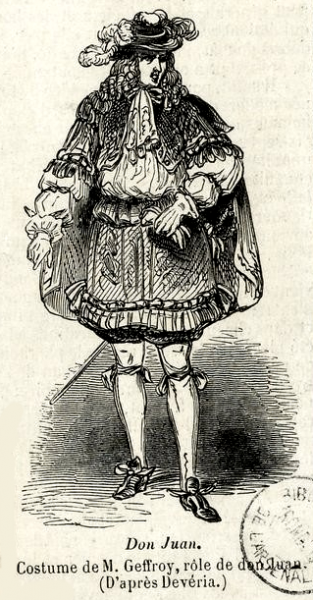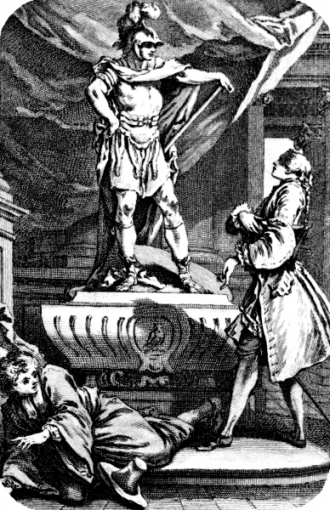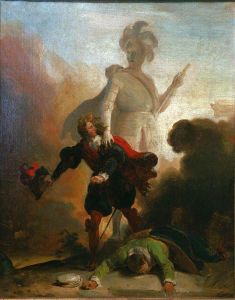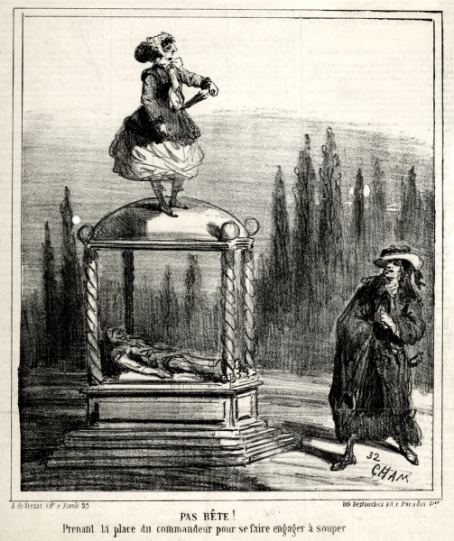
Dom Juan et la statue du Commandeur par Alexandre-Évariste Fragonard
Our dramatis personæ is:
DON JUAN, son of Don Louis
SGANARELLE, valet of Don Juan
DONNA ELVIRA, wife of Don Juan
GUSMAN, horseman (écuyer) to Elvira
DON CARLOS, brother of Elvira
DON ALONSE, brother of Elvira
CHARLOTTE, peasant-girl
MATHURINE, peasant-girl
PIERROT, peasant
THE STATUE OF THE COMMANDER
LA VIOLETTE, a lackey of Don Juan
RAGOTIN, a lackey of Don Juan
M. DIMANCHE, merchant
LA RAMÉE, swordsman (spadassin)
ENTOURAGE OF DON JUAN
ENTOURAGE OF DON CARLOS AND DON ALONSE
A GHOST
Set in Sicily
We left Dom Juan wishing his father were dead, which so shocked Sganarelle that he spoke “nonsense,” yet told the truth. He could not speak directly because Dom Juan did not want to hear about “le Ciel,” Heaven. Sganarelle wrapped the truth into a lie. His speech is eloquence (IV. v, p. 56).
ACT THREE
- The beggar
- Two and two makes four
- Dom Juan to the rescue
- The Mausoleum
- Liberty in love
The Beggar
Earlier (III. ii), Dom Juan had given a beggar a Louis d’or, asking him to swear. The Poor Man didn’t swear; he would rather starve. So, Dom Juan left him the Louis d’or “pour l’amour de l’humanité” (for the love of mankind).
Two and two makes four
In my last post, I wrote that Dom Juan’s belief is:
Je crois que deux et deux sont quatre, Sganarelle, et que quatre et quatre sont huit.
Dom Juan à Sganarelle (III. i, p. 36)
[I believe that two and two makes four, Sganarelle, and that four and four makes eight.]
Dom Juan to Sganarelle (III. 1, p. 31)
Dom Juan to the rescue
In the following scene (III. iv), Dom Juan saves Dom Carlos from attackers, not knowing he is Elvire’s brother:
La partie est trop inégale, et je ne dois pas souffrir cette lâcheté
Dom Juan à Sganarelle (III. ii, p. 39)
[One man attacked by three? The match is too lopsided, and I cannot allow such baseness.]
Dom Juan to Sganarelle (III. 2, p. 34)
Dom Juan saves Dom Carlos’ life, incurring a debt. However, when his brother, Dom Alonse, joigns him, Dom Carlos learns that he was saved by the family’s “mortal enemy.”
Ô Ciel, que vois-je ici? Quoi, mon frère, vous voilà avec notre ennemi mortel?
Dom Alonse (III. iii, p. 42)
O, Heavens! What am I seeing? What? My brother, you are here with our mortal enemy?
Dom Alonse (III. 3, p. 36)
For the two brothers, having Dom Juan at arm’s length is a perfect opportunity to avenge their offended sister. But Dom Carlos postpones the moment they will avenge Done Elvire, Dom Juan’s abandoned wife. Dom Juan likes Dom Carlos who is indebted to Dom Juan.
Il est assez honnête homme, il en a bien usé, et j’ai regret d’avoir démêlé avec lui.
Dom Juan à Sganarelle (III. v, p. 45)
[He seems quite honorable, he used me well, and I am sorry now to be mixed up in this affair with him.]
Dom Juan to Sganarelle (III. 5, p. 39)
Il vous serait aisé de pacifier toutes choses.
Sganarelle à Dom Juan (III. v, p. 45)
[Sir, it would be easy enough for you to make peace.]
Sganarelle to Dom Juan (III. 5, p. 39)
Although he has killed the Commandeur and abandoned his wife, Done Elvire, Dom Juan’s life could be spared, Molière has situated the duel before the curtain rises. So, the death of the Commandeur remains a serious issue, but… Sganarelle is “all-too-human” valet.[1] He fears. But Dom Juan, his master, is a Grand Seigneur.
Et n’y craignez-vous rien, Monsieur, de la mort de ce commandeur que vous tuâtes il y a six mois?
Sganarelle à Dom Juan (I. ii, p. 9)
But do you fear nothing, Sir, from the death of the commander that you killed here six months ago?
Sganarelle to Don Juan (I. 2, p. 7)
J’ai eu ma grâce de cette affaire.
Dom Juan à Sganarelle (I. ii, p. 9)
[I had my right in this affair.]
Dom Juan to Sganarelle (I. 2, p. 8)
Oui, mais cette grâce n’éteint pas peut-être le ressentiment des parents et des amis, et…
Dom Juan à Sganarelle (I. ii, p. 9)
[Yes, but your right did not perhaps vanquish the resentment of his family and friends, and…]
Dom Juan à Sganarelle (I. 2, p. 8)
The courts may have cleared Dom Juan of wrongdoing, but the Commandeur had a family. When one thinks that “two and two makes four,” one excludes elements that cannot be quantified. Don Juan believes he was cleared, so he washes his hand. Fatal error!
Liberty in love
Our pèlerins are then visited by Done Elvire who wishes Dom Juan could lie to her, and return to her. Would that urgent business had taken him. One could say that she pardons lies, but that is questionable. She has been abandoned and a loving wife just might roll back reality not to have been abandoned. But Dom Juan loves “liberty in love:”
Oui, mais ma passion est usée pour Done Elvire, et l’engagement ne compatit point avec mon humeur. J’aime la liberté en amour, tu le sais, et je ne saurais me résoudre à renfermer mon cœur entre quatre murailles. Je te l’ai dit vingt fois, j’ai une pente naturelle à me laisser aller à tout ce qui m’attire. Mon cœur est à toutes les belles, et c’est à elles à le prendre tour à tour, et à le garder tant qu’elles le pourront.
Dom Juan à Sganarelle (III. v, p. 45)
[Yes; but my passion for Elvira is spent, and such jessies do not suit my humor. I love liberty in love, as you know, and I could not resign myself to enclosing my heart between four walls. I have told you twenty times, I have a natural inclination to let myself veer towards everything that attracts me. My heart belongs to all the beauties, and it is up to each of them in turn to assume it and to keep it as long as they can.]
Dom Juan to Sganarelle (III. 5, p. 39)
The Mausoleum
In Act Three Scene Four Dom Juan and Sganarelle inadvertently enter the Commender’s burial ground. Sganarelle tries to pull Dom Juan away:
Monsieur, n’allez point là.
Sganarelle à Dom Juan (III. iv, p. 46)
[Sir, you shouldn’t go there.]
Sganarelle to Dom Juan (III. 4, p. 40)
Cela n’est pas civil, d’aller voir un homme que vous avez tué.
Sganarelle à Dom Juan (III. v, p. 46)
It would not be civil to go see a man that you’ve killed.
Sganarelle à Dom Juan (III. 4, p. 40)
But Dom Juan thinks it a civilité to approach the Commender’s coffin. In fact, the coffin opens and reveals a beautiful mausoleum and the Statue of the Commender. Sganarelle marvels effusively as Dom Juan assesses matters:
Ah, que cela est beau! les belles statues! le beau marbre! les beaux piliers! Ah, que cela est beau, qu’en dites-vous, Monsieur?
Sganarelle à Dom Juan (III. iv, p. 46)
[Ah! So beautiful! Beautiful statues! Beautiful marble! Beautiful pillars! Ah, it’s so beautiful! What do you say about it, Sir?]
Sganarelle to Dom Juan (III. 4, p. 40)
Qu’on ne peut voir aller plus loin l’ambition d’un homme mort, et ce que je trouve admirable, c’est qu’un homme qui s’est passé durant sa vie d’une assez simple demeure, en veuille avoir une si magnifique pour quand il n’en a plus que faire.
Dom Juan à Sganarelle (III. v, p. 46)
[That one cannot see the ambition of a dead man go any farther than this: and what I find most amazing is that a man who occupied, during his life, a simple enough abode, would want such a magnificent one for when he has nothing left to do.]
Dom Juan à Sganarelle (III. 5, p. 40)
At this point the statue comes alive. It bends its head and Dom Juan quite boldly asks Sganarelle to invite the Statue to supper.
Il aurait tort, et ce serait mal recevoir l’honneur que je lui fais. Demande-lui s’il veut venir souper avec moi.
Dom Juan à Sganarelle (III. v, p. 46)
[And he would be wrong; and it would be to receive but poorly the honor that I do him. Ask him if he would like to dine with me.]
Dom Juan to Sganarelle (III. 5, p. 40)

ACT FOUR: Civilités
- Monsieur Dimanche
- Dom Louis
- Done Elvire
Monsieur Dimanche
Dom Juan uses civility (faisant de grandes civilités) to send away monsieur Dimanche (Sunday), his creditor. Form as substance …
Dom Louis
In Scene Four, Dom Juan listens to his father who would like his son to convert. Dom Juan is a womanizer who has left his wife.
Dom Juan does not respond. Instead, he invites his father to sit down so he would be more comfortable. Dom Louis leaves and as we know, as soon as he is out of hearing, Dom Louis wishes him dead.
Dom Juan has asked his valet never to remonstrate if “le Ciel” is a factor. But Sganarelle wraps the truth into a lie. He speaks obliquely.
Done Elvire
Dom Juan is then visited by a changed Done Elvire. She is veiled and preparing to go to a retraite, perhaps a convent, and wishes to pull out Dom Juan from a precipice. He must repent. But she goes on to say how much she has loved him:
Je vous ai aimé avec une tendresse extrême, rien au monde ne m’a été si cher que vous, j’ai oublié mon devoir pour vous, j’ai fait toutes choses pour vous, et toute la récompense que je vous en demande, c’est de corriger votre vie, et de prévenir votre perte. Sauvez-vous, je vous prie, ou pour l’amour de vous, ou pour l’amour de moi.
Done Elvire à Dom Juan (IV. vi, p. 58)
[I loved you, Don Juan, with extreme tenderness, and nothing in the world was dearer to me than you. For you, I abandoned my duty, for you, I did everything; and all the recompense that I ask of you, is to correct your life, and avert your eternal loss. Save yourself, I beg you, either from love of yourself, or for love of me.]
Done Elvire to Dom Juan (IV. 6, p. 51)
As Elvira speaks, Sganarelle cries:
Tu pleures, je pense.
Dom Juan (IV. vi, p. 70)
You’re crying, I believe.
Dom Juan (IV. 6, p. 51)
We can also hear Sganarelle say “pauvre femme” and “cœur de tigre” (heart of a tiger). Unbelievably, Dom Juan is charmed. He invites Elvire to spend the night in his home. She refuses. One suspects that Elvire has said more than she wanted.
Sais-tu bien que j’ai encore senti quelque peu d’émotion pour elle, que j’ai trouvé de l’agrément dans cette nouveauté bizarre, et que son habit négligé, son air languissant et ses larmes ont réveillé en moi quelques petits restes d’un feu éteint?
Dom Juan à Sganarelle (IV. vii, p. 59)
[You know I think I felt a little glimmer of emotion for her, and even found something rather pleasurable in this new extravagance. Her careless clothes, languishing air and tears seemed to reawaken in me a few embers of a doused fire.]
Dom Juan to Sganarelle (IV. 7, p. 52)
The Statue has come for supper and invites Dom Juan to join “it” for supper the following day. Dom Juan accepts the Statue’s invitation saying that he will be accompanied by Sganarelle.
ACT FIVE
James Doolittle writes that “for Dom Juan the excellence of humanity consists in a man’s realization of his manhood by functioning fully as a man, not as an angel, not as a beast, not in passive potentiality, but in active fact. He must have the aspiration, the will, the knowledge, and the courage actively to prove himself superior to the rest of nature, as well as to whatever conventional opposition he may encounter which it does. This is what the Poor Man [the beggar] does, and Dom Juan wishes to function in like manner.”[2]
Let us keep the above in mind and continue reading.
At the very beginning of Act Five, Dom Juan makes his father believe that he has converted. Dom Louis can’t wait to tell his wife. Sganarelle wonders why Dom Juan does not yield the statue? It moves and speaks:
Vous ne vous rendez pas à la surprenante merveille de cette statue mouvante et parlante?
Dom Juan is perplexed:
Il y a bien quelque chose là-dedans que je ne comprends pas, mais quoi que ce puisse être, cela n’est pas capable, ni de convaincre mon esprit, ni d’ébranler mon âme, et si j’ai dit que je voulais corriger ma conduite, et me jeter dans un train de vie exemplaire, c’est un dessein que j’ai formé par pure politique, un stratagème utile, une grimace nécessaire, où je veux me contraindre pour ménager un père dont j’ai besoin, et me mettre à couvert du côté des hommes de cent fâcheuses aventures qui pourraient m’arriver. Je veux bien, Sganarelle, t’en faire confidence, et je suis bien aise d’avoir un témoin du fond de mon âme et des véritables motifs qui m’obligent à faire les choses.
Dom Juan à Sganarelle (V. ii, pp. 63-64)
[I admit there was something in it that I don’t understand; but it was still not powerful enough to either convince my mind or shake my soul; and if you heard me say that I would amend my conduct and embark on an exemplary life, it was a design formed out of pure policy, a useful stratagem, a necessary grimace that I adopted in order to manage a father of whom I have need, and to protect myself, in the eyes of men, from a hundred irritating adventures which might arise. But I am really glad, which might arise. But I am really glad, Sganarelle, that I can confide in you, and I am happy that my soul has a witness to the real motives which oblige me to do the things I do.]
Dom Juan to Sganarelle (V. 2, pp. 56-57)
The fact that the statue moved is something Dom Juan cannot understand. His response is to become a hypocrite so he will be protected. He is so pleased Sganarelle can understand. But Sganarelle cannot understand. Don Juan does not believe in God, yet would feign devotion:
Quoi? vous ne croyez rien du tout, et vous voulez cependant vous ériger en homme de bien?
Sganarelle à Dom (V. ii. p. 64)
[What? Though you don’t believe in anything at all, you would take the pose of a pious man?]
Sganarelle to Dom Juan (V. 2, p. 57)
Sganarelle is furious and will now remonstrate, without wrapping the truth into a lie:
Ô Ciel! qu’entends-je ici? Il ne vous manquait plus que d’être hypocrite pour vous achever de tout point, et voilà le comble des abominations. Monsieur, cette dernière-ci m’emporte, et je ne puis m’empêcher de parler. Faites-moi tout ce qu’il vous plaira, battez-moi, assommez-moi de coups, tuez-moi, si vous voulez, il faut que je décharge mon cœur, et qu’en valet fidèle je vous dise ce que je dois. Sachez, Monsieur, que tant va la cruche à l’eau, qu’enfin elle se brise; …
Sganarelle (V. ii, p. 65)
[Heavens! Am I hearing this? All you lacked before to perfect your arsenal was this hypocrisy! And presto! Here it is: the acme of abominations. Sir, this latest manner is just insufferable and I can no longer bite my tongue. Do to me what you will, beat me, knock me senseless, kill me, if you wish: but I must air out my heart, and as a faithful valet I must tell you what I should. Know, Sir, that the more times a jug goes to the well, at last it will break; …]
Sganarelle (V. 2, p. 58)
Dom Carlos and Dom Alonse return. They are ready to overlook Dom Juan’s escapade, but cannot let their sister become a recluse. Dom Juan must return to his wife. Our seducer switches to false piety to get rid of them. The society of the play has been fooled! Has it? No, the society of the play has doubled itself. The statue, the infinite, takes Dom Juan by the hand and throws him into a fiery abyss. He does not resist. He knew. He always knew …
Except for giving the beggar a Louis d’or and saving Dom Carlos, what has Dom Juan done that would allow him to claim superiority. Why should the statue, the infinite, be honoured to have supper with him?
A hero, he isn’t. We are told that he has “seduced” several women and forced fathers to fight duels they could not win, Dom Juan being much younger, stronger, and the superior swordsman.
He falls in love with Charlotte and promises marriage, only to turn his attention to what may be a lovelier face: Mathurine.
Jean Rousset has called him “un homme de vent,” a man of wind.[3] He will go the way the wind blows.
But Dom Juan, who so wishes to break barriers, is not belittled by Molière. What a fine opportunity to use machines.
Dom Juan is a five-act play, as in “grandes comédies,” but the plot formula used by Molière is that of the farce: trompeur trompé, the deceiver deceived.

Dom Juan par François Boucher (
RELATED ARTICLES
- Reading “Dom Juan” (Part Two)
- Reading “Dom Juan” (Part One)
- Don Juan: the Cycle & the Traditions
- Molière page
Sources and Resources
- Dom Juan is a toutmolière.net publication
- Don Juan is a translation by Brett B. Bodemer
- Molière 21 is research group
- Images belong to the BnF, unless otherwise stated
____________________
[1] W. G. Moore, Molière: a New Criticism (Oxford: Clarendon Press, 1956 [1949]), p. 96.
[2] James Doolittle, The Humanity of Molière’s Dom Juan in Jacques Guicharnaud, Molière, A Collection of Critical Essays (Englewood Cliffs, N.J. : Prentice-Hall, 1964), p. 101.
[3] Jean Rousset, L’Intérieur et l’extérieur : Essais sur la poésie et sur le théâtre au XVIIe siècle (Paris : Librairie José Corti, 1968), p. 138.
Love to everyone 💕
I apologize for the delay.
Mozart’s Don Giovanni, Là ci darem la mano
Rodney Gilfry – Don Giovanni
Liliana Nikiteanu – Zerlina

Alexandre-Évariste Fragonard (commons.wikimedia.org)
© Micheline Walker
16 August 2019
WordPress



More most impressive scholarship
LikeLike
Dom Juan is a very good play and a relatively simple one. Dom Juan is thrown into hell because there is a dimension he cannot see: the infinite. Sganarelle marveled at what God had created, but he knew he was a mere mortal. This is the one play where Molière asked the “big” questions. Thank you for writing and best regards to the two of you. 🙂
LikeLiked by 2 people
I really enjoy your insights on DJ and Moliere. I am rehearsing for Elvira and find it a fine challenge! Your knowledge is a great help. Thank you for posting this.
LikeLike
I do hope my insights help you. Dom Juan is a difficult play and Elvira a complex role. She is tempted to avenge herself, but she cannot. The second time she visits him, she wishes to prevent the final catastrophe, but she ends up revealing that she loves him and he is touched. Marriage is a promise and Elvira’s brothers are ready to forgive DJ, if he will be a husband, but … I’m sure you’ll do very well. Elvira is a major role. I thank you for writing to me.
LikeLiked by 1 person